![]()
Farish had talked of situations “so full of all qualities of
loveliness and purity, such new regions of high thought and feeling?
that to the dwellers in past days it should seem rather the production
of angels than of men.” Madras Christian Instructor and Missionary
record (1844).
The Baroque music in the forests of Bolivia, did indeed sound like the
production of angels. Cecilia had brought us all over during the “VI
Festival Internacional de teatro Santa Cruz”. The church itself was
quite beautiful. Helmut’s comment, “At least the church did something
good”, rang in my ears. I see this beautiful land, one of the few in
South America where the indigenous people haven’t been largely
decimated. I see extermination of their religion, their language and
struggle to see how it was all dressed as civilization. I see the
ornate walls of the grand church and listen to the untold stories
screaming to be heard.
Thousands of miles away, a young Bangladeshi photographer Munem Wasif,
gives up the ‘respectable professions’ chosen for him and decides to
be a story teller. The third Pathshala alumni to be selected for the
prestigious Joop Swart Masterclass tells an ordinary story. One of his
growing up. But at a time when the only stories told are those told by
the conqueror, it is time the story tellers changed.
Shahidul Alam
Santa Cruz, Bolivia
30th April 2007
I had arrived to this world at just past noon on an overcast, rainy day some seventeen years before the new millennium. Following my birth, my mother moved back to our ancestral home in provincial Comilla. My real growing up was to start there. This move would lay the foundations of the person I would become. Like any other boy of my age, growing up in a small town, everyday carefree life coupled with a complex web of friends and family made up my world. Meandering over wishful thoughts of flying airplanes, riding bikes at will, kicking battered footballs under the incessant rain, and later trying to make excuses to my mother were all an integral part of this time. I grew up with cousins and uncles all around me. This developed a close-knit relationship with my family and deeply instilled in me a feel of collective being. After completing my middle schooling in Comilla, as I was pushed between the honking horns and blinding lights of the capital, Dhaka, I left behind the easy life of small town settings, but something came with me. A sense of belonging to the people, the place, the innocuous values of small town life ? the closeness of it all ? came bundled with the person that was to start a new journey in the city. It was hard. The days of pace and nameless acquaintance was fixated with forgetfulness. Homesick for my mother and sister, the nights were crossed with bouts of restlessness. To make the best out of such a turbulent time, my uncle admitted me to a photography course. While the medium had not appeared in any formal mode before, growing up in a visually explosive country with riots of colors all around, it instantly grabbed my attention. In fact, more so than the formal academics, which experienced a roll of turbulence along this time, as days of frenzied fermentation of variant frames were followed by equally fantastic nights of soul searching within those ?newly discovered? worlds. Sounding as tacky as one might, but seeing everything through a new pair of eyes is how I felt! Even before I had started to look with my own eyes at the unsettling, new environment of the city revolving around me, I was peering down a looking glass that was to be the lens. It gave me a wider, yet probing look, and one may say, meaning, to the lives in trepid spin within and beyond my periphery. The common place humdrum of daily activity suddenly imposed a rather ?larger than life? frame upon me. Call me idealistic but to me life must hold more meaning than just a fat paycheck, the proverbial suburban home, and the prescribed way to the promised, prescribed happy life. To me exploring my dreams ? the ones that were born and not imposed ? and realizing it ? by pushing the very boundaries of reality and imagination ? as far as possible is the path to self-actualization. I often ask myself ? ?do we try to create a mirror world when we take a picture??, ?do we want to see something that might have passed us by otherwise?? Well, I think we do. And I have come to believe that that is the singular, yet important, reason I am drawn to photography. It gives me time and space to a stand, maybe even suspended in motion, to search and delve into myself and my surroundings. Till now, and in the coming frames, I explore the dreams that are yet to be born.
Munim Wasif. Dhaka




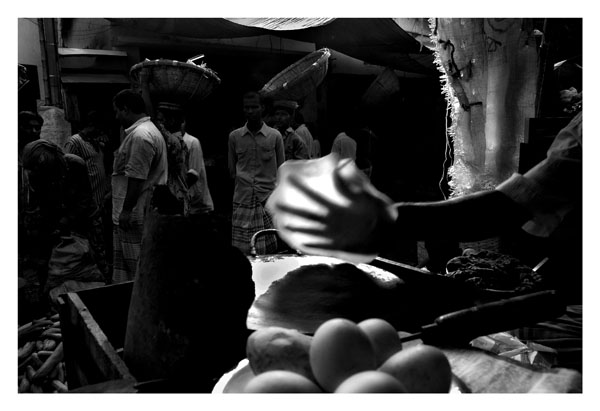
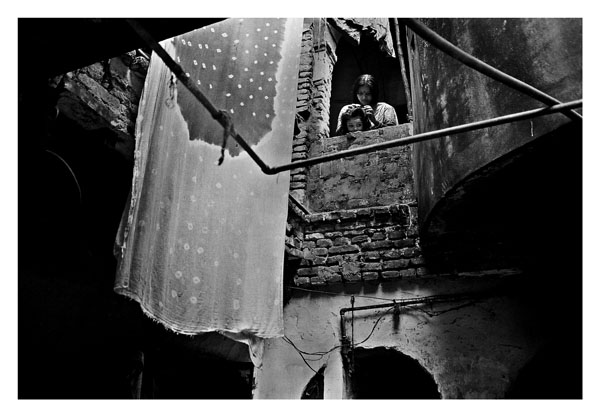
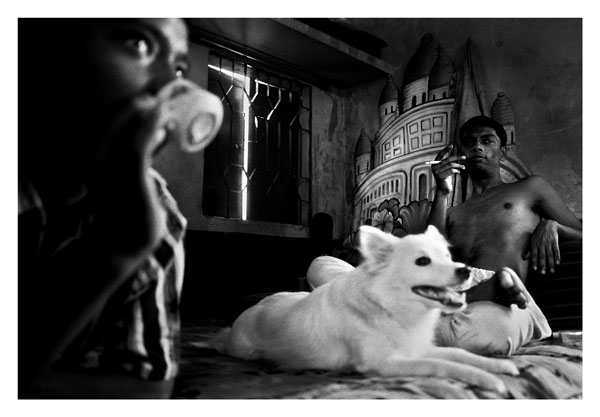
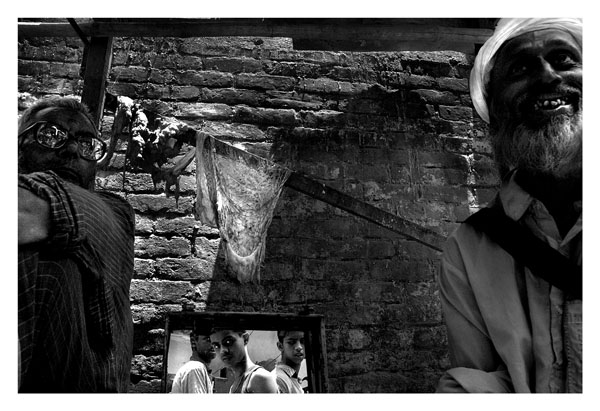

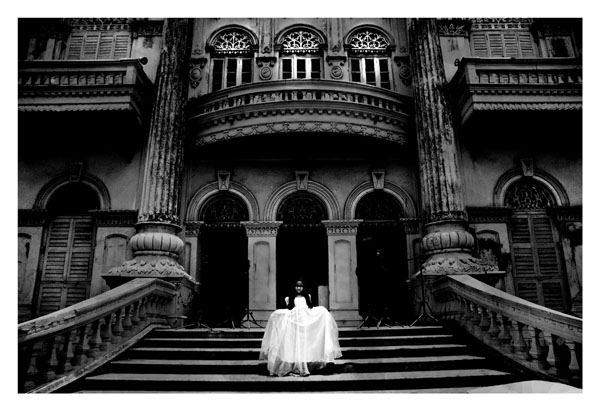
Category: Bangladesh
Happy?s New Year
My first podcast
?No one ever comes back,? she said. She was baleful, half a tear welling on her eyes. I had no way of knowing when I might be back. I hugged her tight as she sat on my lap, but my words were not convincing. She had been promised many times before and knew not to be too wishful. The name ?Happy? seemed a difficult one to use to describe her. Yet minutes before Happy Akhter Nodi and I had been playing, laughing, teasing one another. She was probably around 10. She didn?t really know, and I couldn?t really tell.
Her mother had brought her over to the Sonar Bangla Children?s home three years ago. Happy had wanted to come herself. She wanted to study. To become a doctor. To serve people. But parting had been sad. Her mother had come to see her on previous new year days, but this time she?d rung to say she couldn?t make it. There was too much work over the holidays. Happy understood, but it didn?t make it any easier. She wanted to go to the fair, to buy toys, to dress up in a new sari. She wanted her mum. Happy was spunky, bubbly, naughty, and dying to be loved. I tried to tell her that her mother might come another day. We both knew I was pretending.
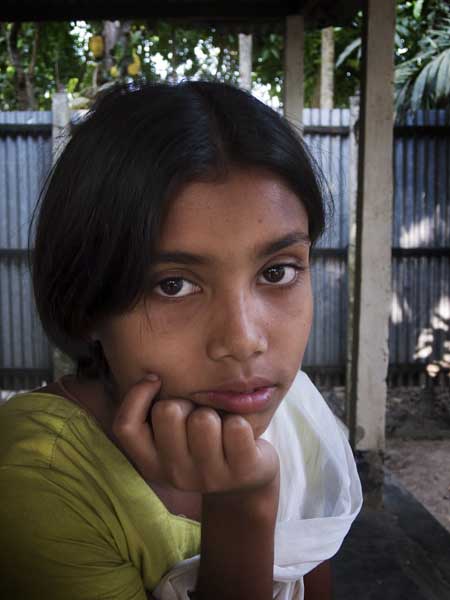
She was being protective of me. Making sure the other kids didn?t hassle me too much. She became my self appointed muse. The poem by Kazi Nazrul I was trying to sit and translate wasn?t easy and they were all impatient. There was a children?s poem in the book, which she remembered from school, but even that didn?t hold her attention. We both knew I would be leaving soon. The sun was coming down and I was waiting for that sweet light when I would photograph Putul (an older girl in the home) in the green paddy fields. I was there on an assignment, and needed to get back to work. I would then go back to Dhaka, and perhaps out of her life for ever.
?You will ring tomorrow, or I?ll never talk to you again.? This had been the biggest threat we knew as children. ?I?ll never talk to you again.? I nodded, not trusting myself to speak. It would be new year?s day, and it gave me some chance to make amends. She snuggled up to me and said, ?You have to give me a name. One just for us.? Despite her sadness, the name Happy had seemed very apt. She was a happy child. They must have given her the name knowingly. Her mother?s name Adori Begum, had also perhaps been a name she had been given. A woman who provided love. When I?d photographed Happy before, she was being her mischievous self. She?d put on a shawl around her head and looked much older than she was. Now she looked smaller than her age, and very fragile.
As the light went down, we went to the paddy fields together, holding hands all the way. Happy jealously warding off the other kids. The light was beautiful and Putul glowed in the green paddy. Then it was time to go. As we walked back she guided me through the bracken, protecting me from every thorn. As we came to a clearing, she looked me over and untangled a rubber band dangling from my pouch. It was a worn band, left over from an old baggage tag at some airport. ?I?ll keep this,? she said. ?Now, give me my name.? I whispered back ?Anmona?. It was all I could think of. This wistful girl, with the bright eyes, full of sadness, suddenly seemed so far away.
We said our goodbyes and as all the children rushed to hug and kiss and wave goodbye, Happy stayed back. Silently she repeated the word ?Anmona?. As the car moved out of the gate I could see her through the dust. She was holding on to a worn ragged baggage tag.
1st Baishakh 1414
Bangla New Year’s Day
On Time Delays
With the characteristic swinging movement of the head interspersed with pendular oscillations that is characteristic of India, Sri Lanka, and to a lesser extent Nepal, Madhav Lohani at the GMG counter in Kathmandu replied, “The flight is on time, but one hour delayed.” While similar, the movement has different meanings in these countries, but the wisdom of Mr. Lohani’s statement removed all ambiguity.
The 12:20 flight which had been rescheduled for 20:20, was now scheduled to depart at 21:20. The TV monitor meanwhile still kept up our spirits with the 20:20 departure time. I was meant to have been traveling on the Biman flight earlier in the day, but that flight too had been cancelled. No one from Biman had been on the counter to explain, so I only learnt of the news when a friendly porter confided in me. Had Mr. Lohani been there, surely his head would have nodded while he said, “The flight is on time but one day delayed.” Continue reading “On Time Delays”
1971 as I saw it
![]()
Thirty five year ago, even longer perhaps, just a camera in hand, they had gone out to bring back a fragment of living history. Today, those photographs join them in protest. Peering through the crisp pages of the newly printed history books, they remind us, “No, that wasn’t the way it was. I know. I bear witness.”
The black and white 120 negatives, carefully wrapped in flimsy polythene, stashed away in a damp gamcha, have almost faded. The emulsion eaten away by fungus, scratched a hundred times in their tortuous journey, yellowed with age, they bear little resemblance to the shiny negatives in the modern archives of big name agencies. They too are war weary, bloodied in battle.
So many have sweet talked these negatives away. The government, the intellectuals, the publishers, so many. Some never came back. No one offered a sheet of black and white paper in return. Few gave credits. The ones who risked their lives to preserve the memories of our language movement, have never been remembered in the awards given that day.
35 years ago, they fought for freedom. They didn’t all carry guns, some made bread, some gave shelter, some took photographs.
(c) Abdul Hamid Raihan
Abdul Hamid Raihan is one such photographer. A.S.M. Rezaur Rahman came upon him through a small interview on television. Unlike many other photographers, Raihan had preserved his negatives. And unlike many researchers, Reza had doggedly pursued. The exhibition, “1971, as I saw it” is not a record of momentous events, but a rare glimpse of what everyday people might have witnessed under occupation and through victory. press-release-english-bangla.doc
——
Autograph ABP presents: The John La Rose Talk Series
Documentary Photography & Social Change: Mark Sealy in conversation with Lyndall Stein and Shahidul Alam at Amnesty International UK
Amnesty International UK
The Human Rights Action Centre
17 – 25 New Inn Yard
London EC2A 3EA
6.30pm – 8.00pm 29th March 2007, Phone +44(0)20 7033 1500, Nearest Tube: Old Street, Moorgate & Liverpool Street
In an age where our daily lives have been saturated by images of globalization there has been a revolt by NGOs and arts organisations who are beginning to forge links and alliances to explore new ways of using visual culture to discuss issues that address a human rights agenda in the 21st century. It is in this context that Mark Sealy the Director of Autograph ABP will explore a conversation that looks specifically at the role photography has played in helping to bring global human rights issues to a wider constituency.
A student screams out to friends from a police van at Jagannath Hall, Dhaka University, after a police raid. 31 January 1996. (c) Shahidul Alam/Drik
—-
Meanwhile Bangladeshi photographers shine at the 3rd China International Press Photo (CHIPP) Contest held in Shanghai from March 21 to 25, 2007


Former Pathshala student Munem Wasif, now working with www.driknews.com wins the bronze prize in the Daily Life category with a powerful piece showing modern forms of slavery, through his story on the workers in the tea gardens of Bangladesh.
Former student of Pathshala and University of Bolton and currently tutor of Pathshala – Andrew Biraj – wins the bronze prize in the Topical News category with his timely piece about the attempts by multinational companies to take over land of indigenous communities,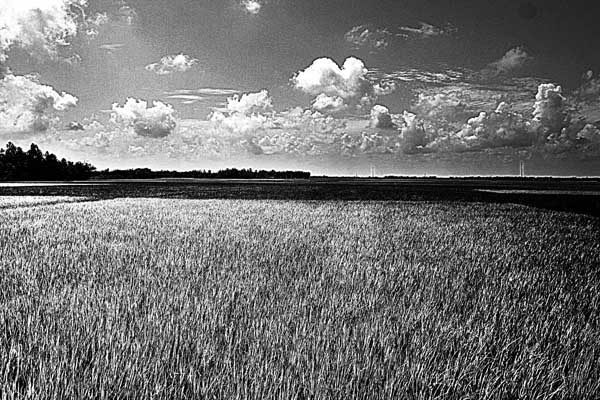



while photographer Shafiqul Islam wins an honourable mention in the same category for his piece on police brutality against women. Biraj and Shafiq are both contributing photographers of DrikNews.

Meanwhile on it’s independence day, Bangladesh moves towards the final eight in the ICC World Cup! However, while we celebrate these wins and the recent arrests of godfathers and the ongoing cleaning up operations, the new laws curbing public freedom continues to worry. The death of Garo activist Cholesh Ritchil (http://www.drishtipat.org/blog/2007/03/19/urgent-modhupur-eco-park-activist-killed-2/) in the hands of ‘Joint Forces’ makes us fearful of the consequences of absolute power.
Justice for Nurjahan
Photographs Shahidul Alam
Text Rahnuma Ahmed
It was reported in the papers as suicide. On 10 January 1993 Nurjahan, a woman in her twenties from a struggling peasant household from the Maulvi Bazar district of north-east Bangladesh, was found dead from poisoning at her parents’ house in the village of Chattokchara.
Nurjahan Begum, 7th among 9 daughters, had been married five years before the incident. However, her husband abandoned her and she returned home to live with her parents. Later, her parents arranged another marriage for her, but since polyandry is forbidden by Muslim law, it was necessary to discover whether her first marriage had been properly dissolved. Nujahan’s father consulted the village imam (religious leader), who declared that she was free to marry. However, he revoked this later and claimed that the marriage was illegal because the first still stood. A shalish (village council for settling disputes and trying offending villagers) met to judge whether Nurjahan and any of her family members had broken the law. The shalish found Nujahan guilty of fornication, on the grounds that she was still married to her first husband; after debating the punishment, it decided that 101 pebbles should be thrown at Nurjahan and her second husband.
Pebbles were preferred to stones since the intention, reportedly, was to shame the couple rather than hurt or kill them. Nurjahan’s parents were also to be punished; the shalish decreed that they should be beaten with a broom. Nurjahan was made to stand in a hole that was then filled, half burying her, to receive her punishment. As she did so a member of the shalish approached her and castigated her for the shame she had brought on her family. She was not fit to live and should kill herself. Nurjahan was found dead the next day.
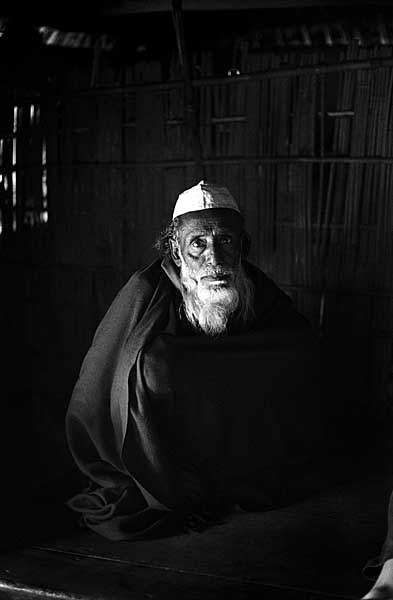
Nurjahan’s father
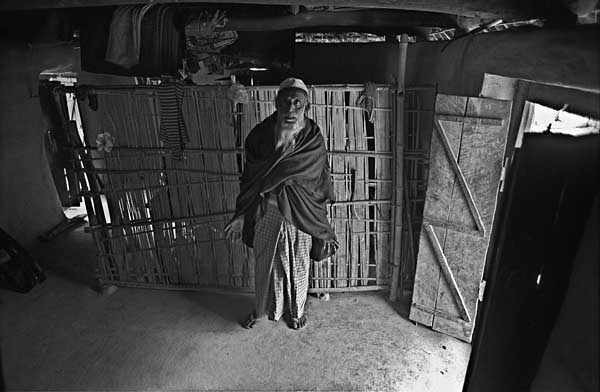
Nurjahan’s father: “This is where I found my daughter’s body.”
The affair was reported in a local newspaper. A campaign was launched by women’s groups to demand a criminal investigation into the circumstances of the death. Public outrage and the success of the campaign turned it into a landmark case;
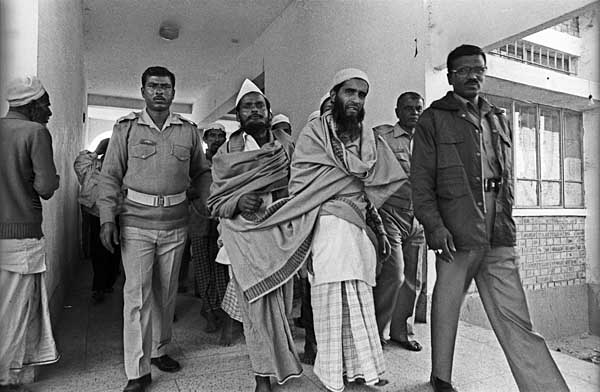
Accused being taken to Moulvibazar court
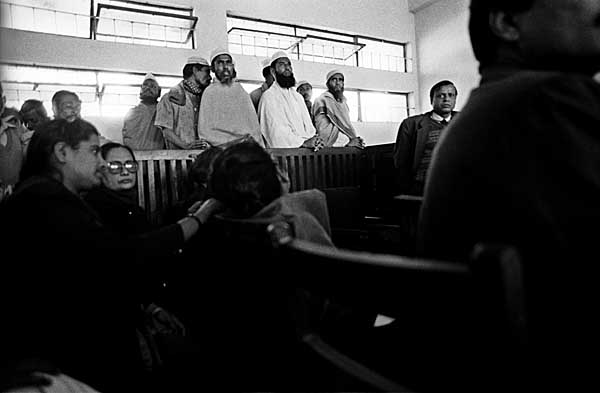
The accused in Moulvibazar court
proceedings were brought against the imam and the members of the shalish only a year after Nurjahan’s death. He and eight others were subsequently found guilty of abetting the suicide and received the maximum possible penalty of seven years’ hard labour. The village shordar (leader) died of illness while in custody.
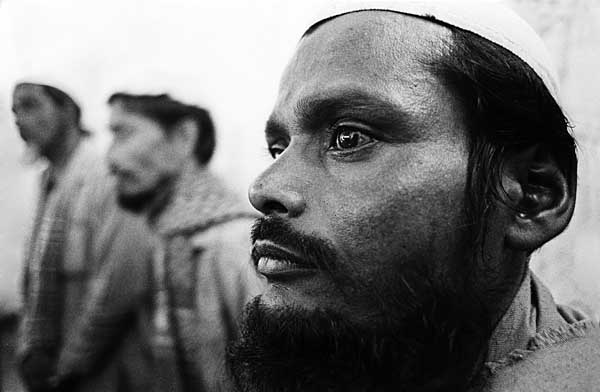
The accused in court jail.
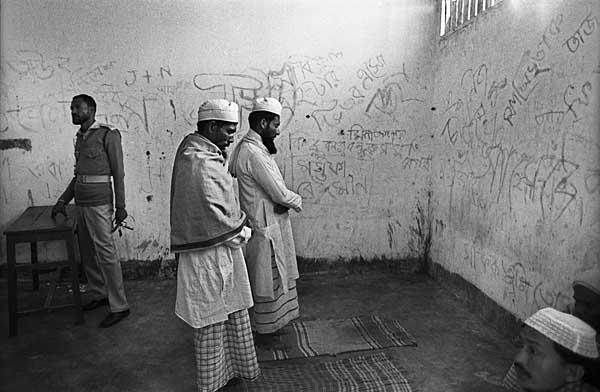
Imam leading prayers in court jail.
Nurjahan’s father believes that his family was made to suffer because of a long-standing enmity between him and the shordar. A female relative of the shordar spoke ill of Nurjahan. “She was a bad woman,” she said. “She would be seen working outside her home.” A rickshaw-puller from Chattokchara came to her defence. “Yes, she worked outside her home. But what other choice did they have?” he argued. “The family is poor.” But he did harbour some doubts. “Why was the wedding held secretly? Why were we not invited?”
Nurjahan’s death has raised many issues for the Bangladeshi women’s movement. Her tragedy has highlighted the manifold forms of women’s subordination within rnarriage, the family and within the community. First, Nurjahan was abandoned by her husband. Then it was the imam who held the knowledge about whether she was free to marry, and he misled her. Finally, it was the members of the shalish, all men, who judged and punished her.
Shalishes have been known to fine and discipline members of the community; at the same time, there are also instances of women disobeying or ignoring and, in some cases, challenging shalish pronouncements. Nujahan’s death has given rise to questions about the sphere of jurisdiction of the shalish, which is a community body with no legal status.
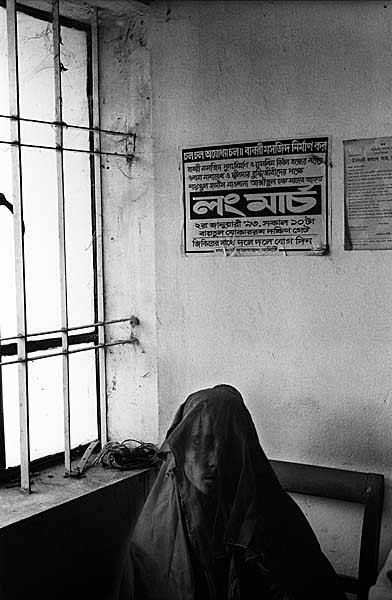
Wife of one of the accused, waiting outside courtroom.
There are few reminders of Nurjahan herself. Of her belongings, a torn corner of a shari, and a shawl she was wearing when she died, have been put aside. Her few remaining clothes were being worn by women in her family. Her only other belongings, a pot and two pans. were being used by her mother.
The family has no photographs. Her grave, like that of the shordar is a small clearing on a hillock near the village, scarcely recognisable as such. The district commissioner promised that the site will be named “Nurjahan tila”.
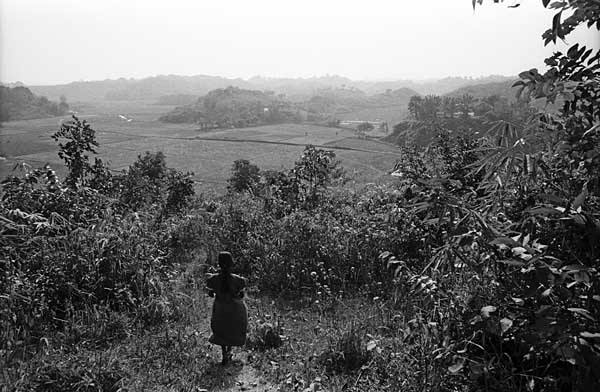
Nurjahan’s sister at her grave.
The government, in turn, announced that a road would soon be built to Chattokchara. However, in all likelihood, this is probably more significant for visiting journalists and officials, than for her family.
Reselling Your Soul to the Devil
![]()

20th anniversary of Ain O Salish Kendra and National Museum auditorium, Dhaka. Bangladesh

Fazle Hasan Abed (left), Muhammad Yunus (centre) and George Soros (right)
Muhammad Yunus, Amartya Sen, Fazle Hasan Abed, George Soros Sultana Kamal. I could hardly have asked for a better photo op. Well it is Christmas! If ever a nation was in need of a pick me up, this was it. The twentieth anniversary of Ain O Shalish Kendra (ASK) had a special significance. This was an organization that has been relentlessly fighting for the rights of the downtrodden. Despite the central bank predicting a 7 percent growth in the coming year, with both parties poised to contest the upcoming election choosing to woo the autocratic general the people had fought to overthrow, and the traditionally secular Awami League (AL) selling out to the Bangladesh Khelafat Majlish (BKM) for supposed electoral gains, the people needed the assurance that at least some still believed in a secular state and the interests of common people.

Amartya Sen lauded ASK and women?s agencies for the role they had played in upholding the rights of women and talked of the importance of freedom of speech.

Muhammad Yunus reminded the audience of ASK?s role in preserving the legal rights of the poor. Both Nobel laureates stayed clear of commenting on the decision that had been made by the major opposition party, which had just buried all of these ideas for political convenience.

Sen gave an eloquent speech, weaving history and his own characteristic economic analysis to point to the role civil society could play in creating a more egalitarian world.

His witty anecdotes about Salma Sobhan, the diminutive but feisty human rights activist who had founded ASK, and his frank accounts of the attempts by him and his friend, our own celebrated economist Rehman Sobhan, in winning over Salma Banu, before she became Salma Sobhan, was a warm and sincere tribute to one of Bangladesh?s finest citizens. But despite the joy of celebration, the mood in the audience was less than ebullient. The high court ban on fatwas had been a hard won battle and the gloom caused by AL?s entente with the other side of the fundamentalist coin, had left everyone shattered. My activist friends were surprisingly unperturbed. ?Well, they have unmasked themselves? said Khushi Kabir, ?it is time we woke up to what the parties really represent.?

Sultana Kamal was similarly defiant but also brought up her concerns. ?It has always been our fight, and now we know what alliances to avoid. But they have effectively robbed me of my voting rights. If I now want someone in parliament to stand up for the rights of women, or the Ahmadiyyas, or for free speech, whom do I turn to? The candidates too have no choice. The few who might have wanted to enter the fray because they wanted to change things, now have no party to turn to.?
Politicians are not known for honesty and candour. AL?s win at any cost deal was defended by Abdul Jalil, the general secretary of AL who signed the document, as he tried to wriggle his way out of the hole he had dug himself into. ?It is an understanding based on an election strategy? and ?any decision is a fatwa? he rambled.
This particular election strategy seems to have left out the voters from the equation. The latest ?fatwa? by the Awami League is a ?decision? that will haunt them.
The Month of Victory
![]()

14th December 1971. The stark dismembered face stared from the bricks in the Rayerbazar graveyard. It was a last ditch attempt by an occupation army to leave a nation they had been unable to subdue, crippled intellectually and culturally. Rashid Talukder’s iconic image was one of numerous outstanding photographs taken by Bangladesh’s best known photojournalist. The lifetime achievement award given to him was long overdue. Rashid Bhai joins other Bangladeshi photographers featured in the Festival of Photography in Asia Chobi Mela IV, whose images grace the much awaited Drik Calendar 2007.
Meanwhile a self appointed head of caretaker government chooses the month of our victory, to call in the military against the wishes of his own cabinet. Kudos to the caretaker advisers who chose to resign rather than going against the interests of the nation. Where ministers have shamelessly stayed on despite blatant exposures of corruption and malpractice, it is a rare example of self-respect.
The Drik calendar 2007 is in the press and is out next week when it will also be available on our website: http://www.drik.net/html/calendar.htm and in our online shopping mall: http://kiosk.mdlf.org/estore/publisher?id=21

Autumn was unkind, rude and remorseful
Spring become unmerciful, rude and murderous
Butterflies don?t die, they don?t live either
Photo: Momena Jalil

Dried Kash flowers at the bank of the Old Brahmaputra. “When I had my legs I could cross the river in one go.” Rajib. Bangladesh/Photo: Saiful Huq Omi.
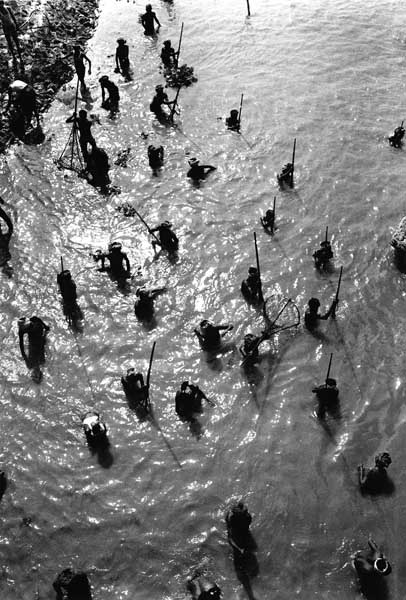
People fishing in a group using traditional techniques. The fishing usually takes place in the dry winter season. Wetlands of Bangladesh/Photo:Rashid Talukder.
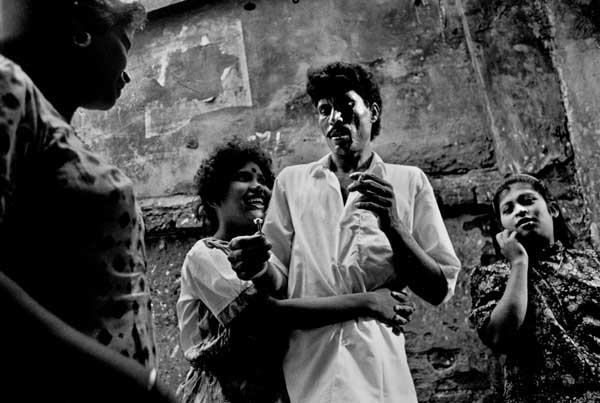
Enticing a prospective client. With roughly 25 customers needed for daily upkeep, competition is intense. Kandupatti brothel, Dhaka. Bangladesh/Photo: Shehzad Noorani.

Every morning After Fazr, Keramat Ali sat here. His work ended at around 10 pm. After 22 years of service, he went back to his home town and his family. No pension and no savings/Photo: Syed Mahfuz Ali
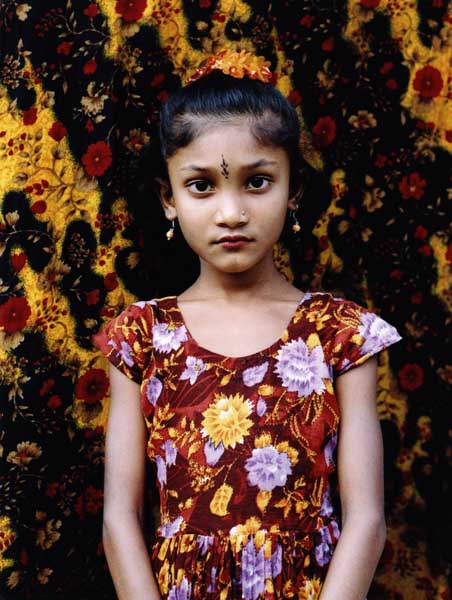
?Mama, take my picture,? my niece Pinki asked me. It was already nearing dusk. I held my breath with the aperture open just enough, and pressed the shutter/Photo: Sheikh Motiar Rahman

Sheep head for shelter at the onset of a storm in the Himalayan range in the Yarlung Valley. Eastern Tibet. China/Photo: Shahidul Alam

She migrated from the Northern district to Dhaka for livelihood. As a sand worker at Gabtoli, she works dawn to dusk for seventy taka. Bangladesh/Photo: Partha Prathim Sadhu

Men saw a large tree trunk in the naked afternoon sun. They don?t pick leaves in the gardens. Kapai Garden, Lashkarpur Tea Estate. Bangladesh/Photo: Munem Wasif

Traders import cows from India prior to the Muslim festival Eid Ul Azha. A cow falls in the water while being unloaded from a boat. Aricha. Bangladesh/Photo: Abir Abdullah

?These are the shacks we live in ? we call them ?Tali? ? there are 1873 families living here at this moment.? Rohinga refugees from Myanmar. Teknaf. Bangladesh/Photo: Mahbub Alam Khan

This is a Road I have been seeing for ages, while I have been happy, sad, upset, romantic, high, low & while growing up. It fills me with memories. They call it the VIP Road/Photo: Gazi Nafis Ahmed (Adnan)
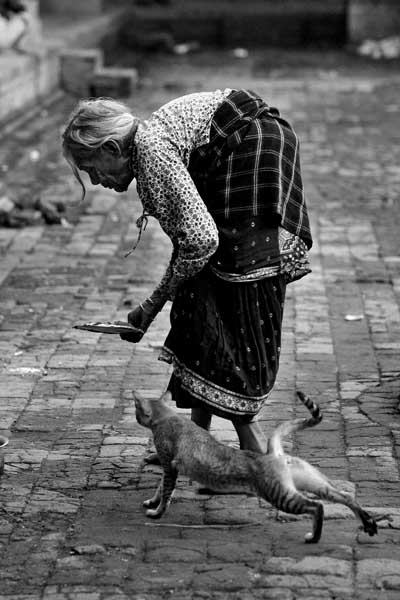
Dipa Thapa, 75, has two pet cats in Pashupati Bridhashram (an Old People?s Home). They are her only friends. Nepal/Shehab Uddin
In the countdown to the election the newly launched DrikNews, promises to challenge the stranglehold of western agencies AP, AFP and Reuters. www.driknews.com is the site to watch.
14th December 2006. Amsterdam
Judge on the docks
![]()

?Come out we won’t shoot?, they had yelled out over the megaphone. Not the most alluring of invitations, particularly when it is from a police van surrounding your flat at midnight. They had thought we were hiding someone and after searching our rooftop had come into our flat. As they left, I had gone out to take pictures from our verandah. Rahnuma had turned up the television volume to hide the sound of the shutter on my Nikon 501, but it still seemed to make a very loud click. Luckily, I wasn?t noticed. It was the 2nd December 1990. Ershad?s autocratic government was feeling the heat. 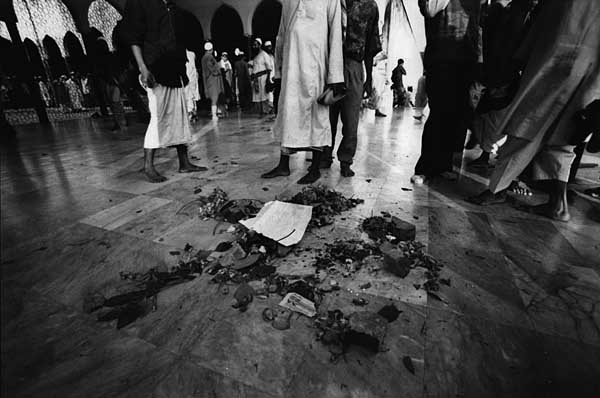
Two days earlier, after the Friday prayers, they had opened fire on the Baitul Mukarram mosque killing a man.
Lawyers had played an important role in our democracy movement. They had upheld writ petitions against the government, and when the government tried to flex its muscles, they came out in protest, united in their stand.

On this day, exactly sixteen years ago, barrister Shahjahan, Sarah Hossain and other lawyers were meant to meet at Drik. We were monitoring the government action, and were ourselves under scrutiny. My colleagues had warned me that plain clothed detectives were looking for me at the office. The detectives seemed to know we lived in Lalmatia, and my colleagues suggested that we stay elsewhere that night. Ma (Rahnuma?s mum), Rahnuma, Tehmina (a lawyer friend of ours) and I went over to Saif and Rini?s flat in Dhanmondi Rd 8. This was not the time for taking chances. The media too had played their role. When censorship became intolerable, they refused to publish. It was that night that Ershad had announced on television that he was going to step down. People were rejoicing in the streets. The following morning the first newspaper was out.
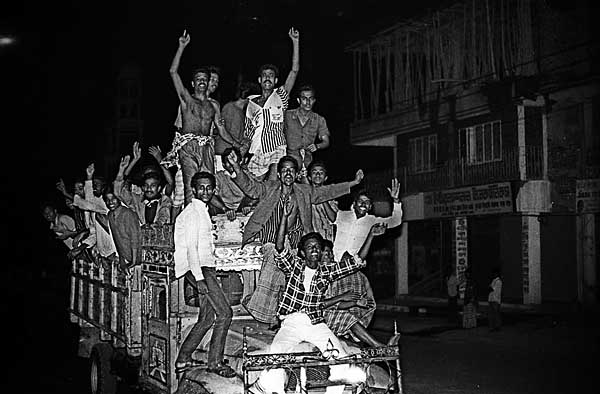

We all went out into the streets. Altaf on his motorbike, me on my bicycle, and the others in whatever transport they could find.

A little girl walked down Mirpur road with a bouquet of flowers in her hand. She too was celebrating the return of democracy. People were dancing in the streets. In Paltan, too often the scene of violence, people gathered in ones and twos.

Men and women in their sleeping clothes, some with children, gathered in the winter night. Chatpati wallas sensing a business opportunity appeared out of the fog. At about 1:30 am Shimul Billa, Bangladesh’s Shirley Temple, sang out ?Bichar poti tomar bichar korbe jara, aj jegeche ei jonota?.

The song ?O judge, the people have risen, it is now the day of your judgement?, was strangely prophetic.
And now in 2006, the chief justice of the supreme court intervenes to prevent a decision
going against a political party, lawyers ransack the court, a president with zero credibility heads a caretaker government, and of all people, Ershad himself is in the streets, demanding the removal of the current president, while Moudud, the chameleon survivor, then Ershad’s right hand man, now holds hands with the chief justice.
4th December 2006
Delhi
The Campaign Begins
![]()
“We travel to Dhaka, in Bangladesh for a celebration of South East Asian photography thanks to a festival called Chobi Mela, on its fourth edition so far. Their theme this year is ‘boundaries’: ideas, aspects, images that divide peoples and cultures. Perfect backdrop for the violence in the country ahead of forthcoming elections…” http://www.bbc.co.uk/worldservice/programmes/the_ticket.shtml. They did a hatchet job on Anita’s interviews, but at least the BEEB did give coverage to Chobi Mela IV.
Besides Cristobal (asleep on the rickshaw) and Norman, all the others have gone back.
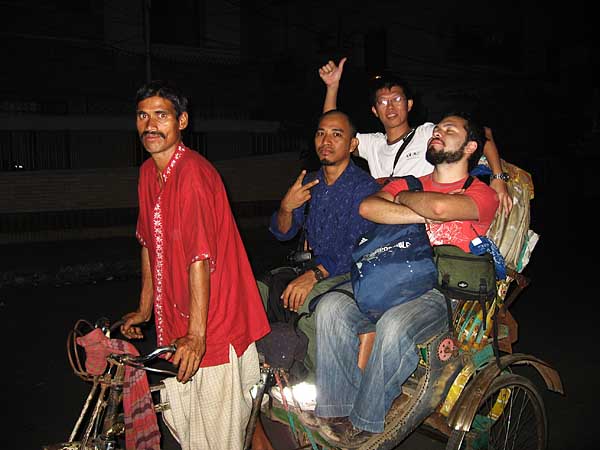
Richard, Wubin and Cristobal, testing out environmentally friendly modes of transport.
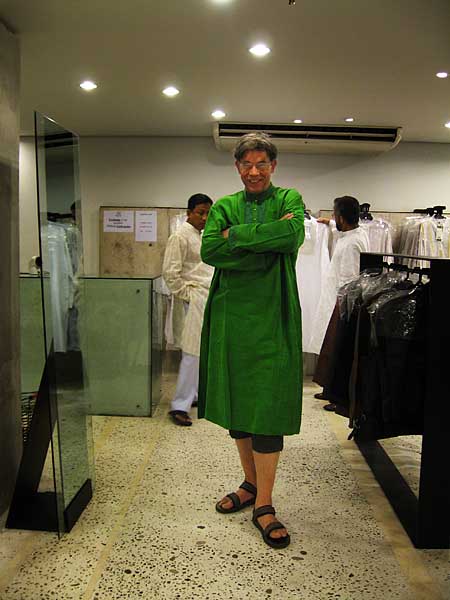
Rupert claims his neighbours need sunglasses to cope with his glistening green punjabi from Dhanmondi Aarong.
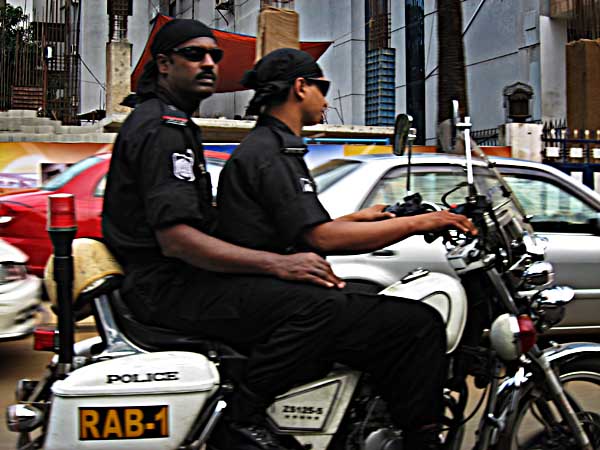
The Rapid Action Battalion (RAB) motorbike cruised slowly past Drik in the morning. Earlier I’d seen them cruise in Gulshan and Baridhara. It was like a scene from Easy Rider, though the ‘crossfire’ victims might not think so. I’ve never seen them in the troubled areas of Paltan, or Muktangon, or anywhere there are clashes between the public and the police. The RAB seem to have different priorities. For the moment at least, the elite force seems only concerned with protecting the elite.
Meanwhile, a Chief Election Commissioner (CEC) takes a strange and undefined ‘leave’, with veiled threats of “I shall return”, and the fighting gives way to election frenzy.
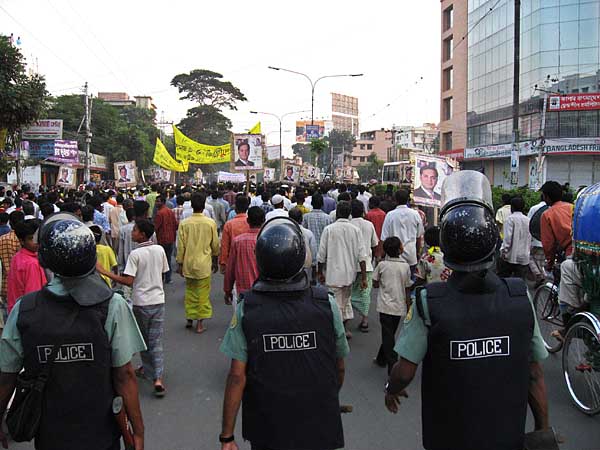
The Police in a different role
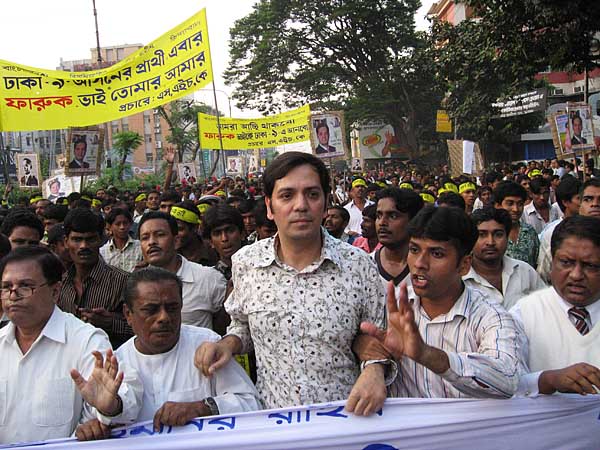
The campaigner, a new kid on the block

Hired supporters, a new form of employment
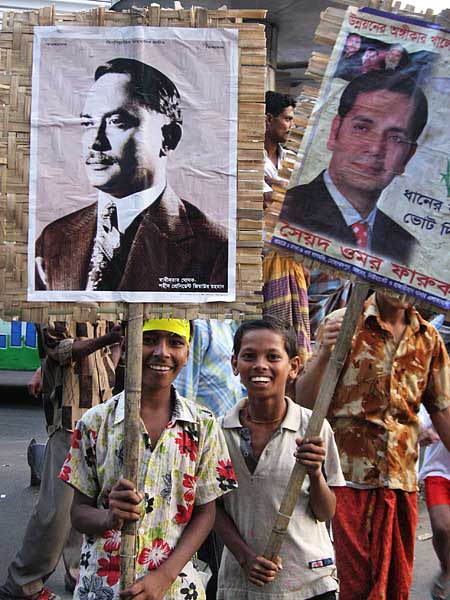
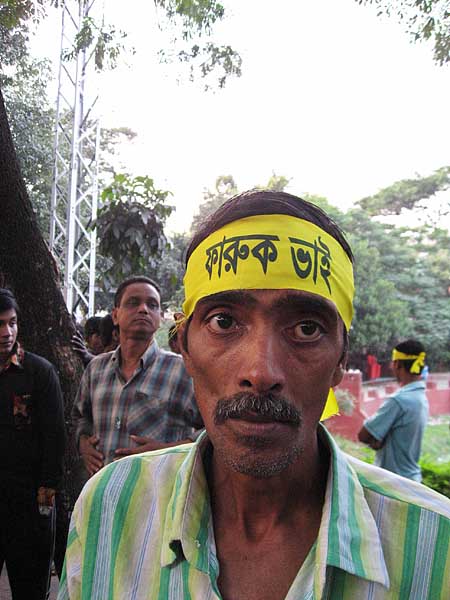
Employment for all

And the inevitable traffic jams
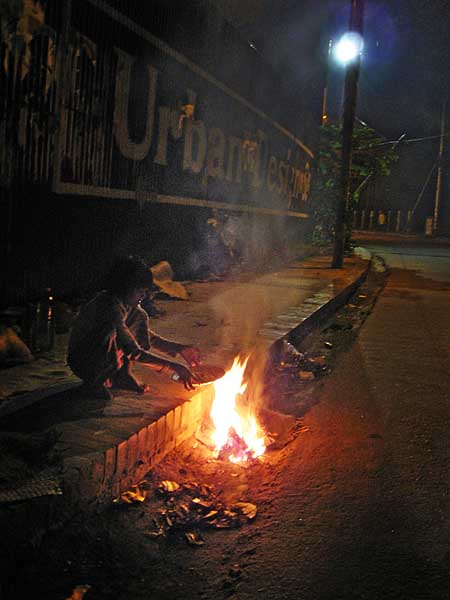
For those trying to avoid the winter chill, the priorities are somewhat different. A girl cooks dinner at Russel Square. Earlier the burning cars provided the flames.
Stretching the Deadline
![]()
An extra day! Not unusual in itself, but considering that a deadline had been announced so long ago, it seems a strange thing to ask for. What could happen in that extra day that could not have happened before? This extra day brings fresh violence, and while the advisers give us hope of ‘light at the end of the tunnel’, it is unfortunate that yet more loss of life continues while the politicians do their tap dance. If the Chief Election Commissioner (CEC) is to step down, he should do so soon. The presence of a party appointee as head of state, head of military and head of government is bad enough. An appointee Chief Election Commissioner armed with a rigged voter list simply cannot be the basis of a fair and free election.
If there be a genuine belief in a multiparty system, the process must involve, putting in place a caretaker government with backbone, and accepting a free and fair election regardless of the outcome.
Providing electricity, ensuring wage increase for garment workers, eliminating rampant corruption and ensuring freedom from extortion and ?crossfire? are far better means of ensuring support, than empty rhetoric, paid goons and spineless sycophants in key positions. There is more blood on the streets today. It is time politicians were made accountable.
It was Nasreen’s birthday on the 18th, but though friends gathered in their Dhanmondi home and sang songs, and Jamila stayed her chirpy self, gloom pervaded the air. The article in the Daily Star brought up renewed doubts about corruption, cover-ups and selling out the country.
Pathshala alumni Monirul Alam is on vigil outside President House. The expectation is that the CEC will be bringing his resignation letter. Drik photographer Shehab Uddin is in Nepal following the peace agreement. Perhaps we too can hope for peace.
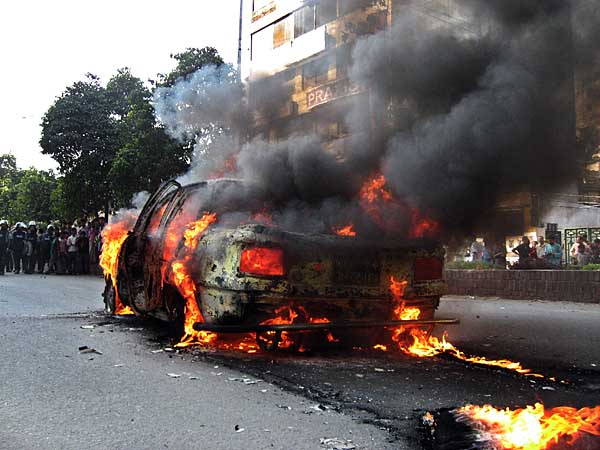
Burning car at Russel Square, close to Pathshala earlier in the afternoon.
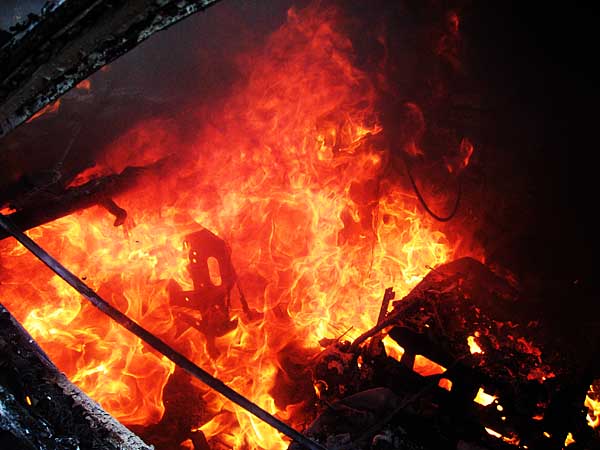
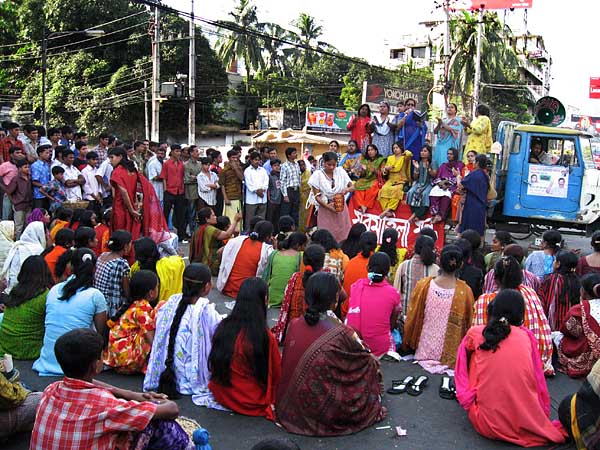
Singing in Mirpur Road
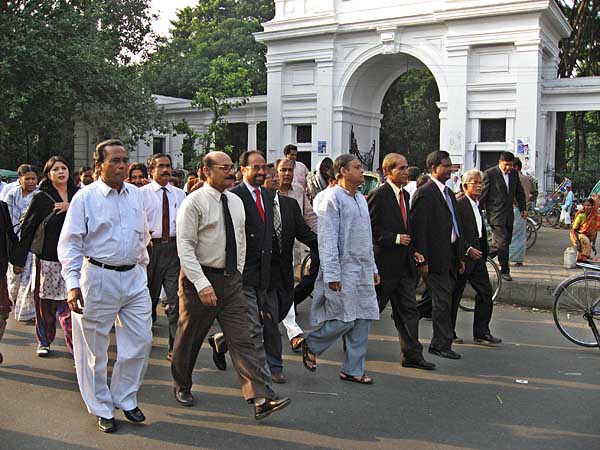
Protesting lawyers coming out of the Supreme Court
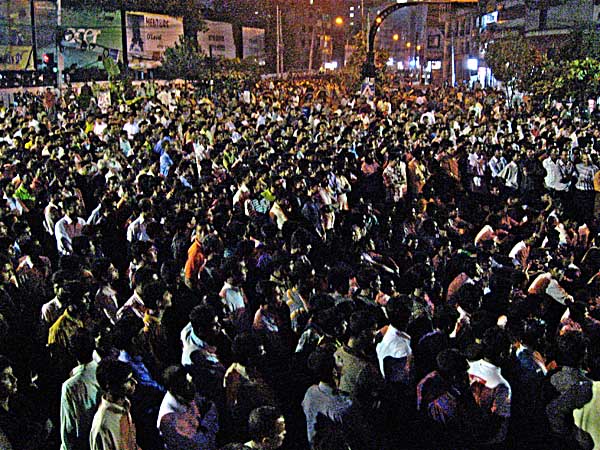
Open air concert at Russel Square last night.
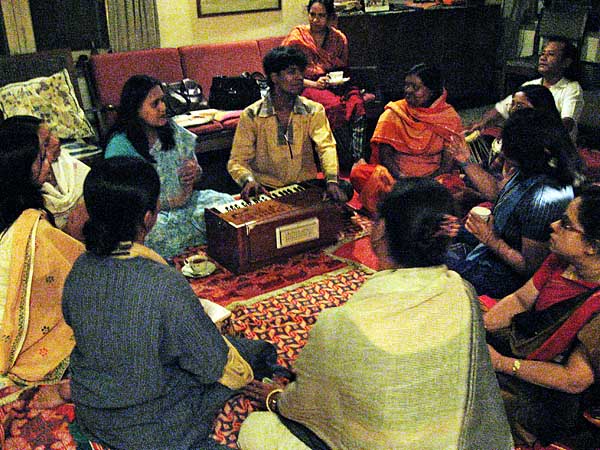
Friends singing on Nasreen’s birthday
Chobi Mela IV continues despite it all. Rashid Talukder opened the splendid exhibition resulting from Morten Krogvold’s workshop, at Shilpakala Academy.
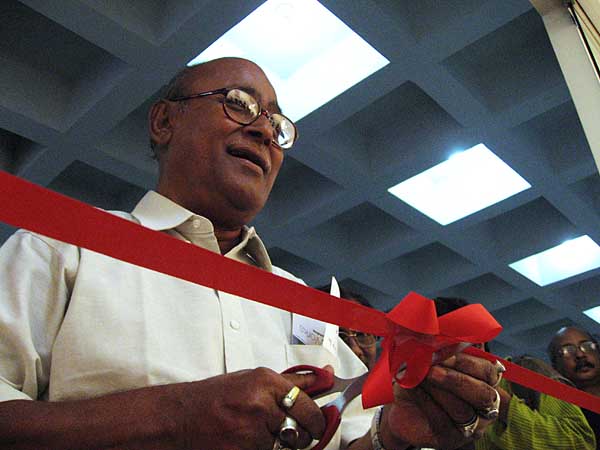
Despite my scraggly beard, Torsten thought I was Father Christmas when I went to drop off the Chobi Mela gift packs at the Goethe Institut, insisting that he teach me the German song that Santa Claus would have sung.
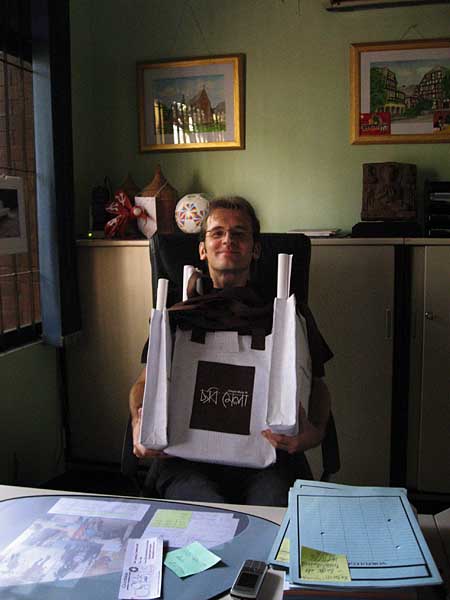
Two and a half years after the opening of the gallery, the airconditioners had still not been installed, but the viewers were not to be deterred, nor were the rag pickers outside Drik, Shanta and her friends, who decided the cool open space of Drik’s new gallery was the best place to try out their break dancing routine.
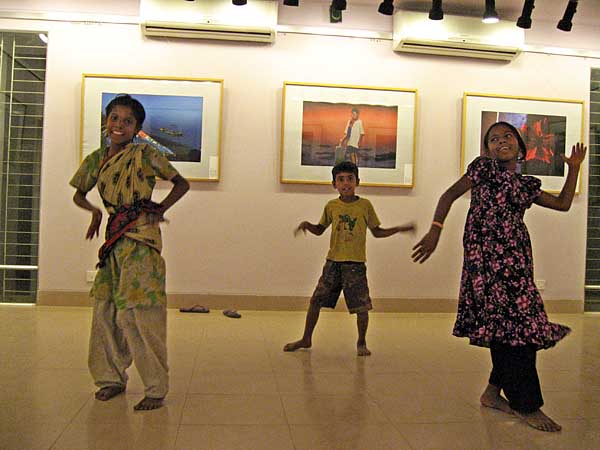
I am sure my pictures on the walls enjoyed their dance. I know I did.
